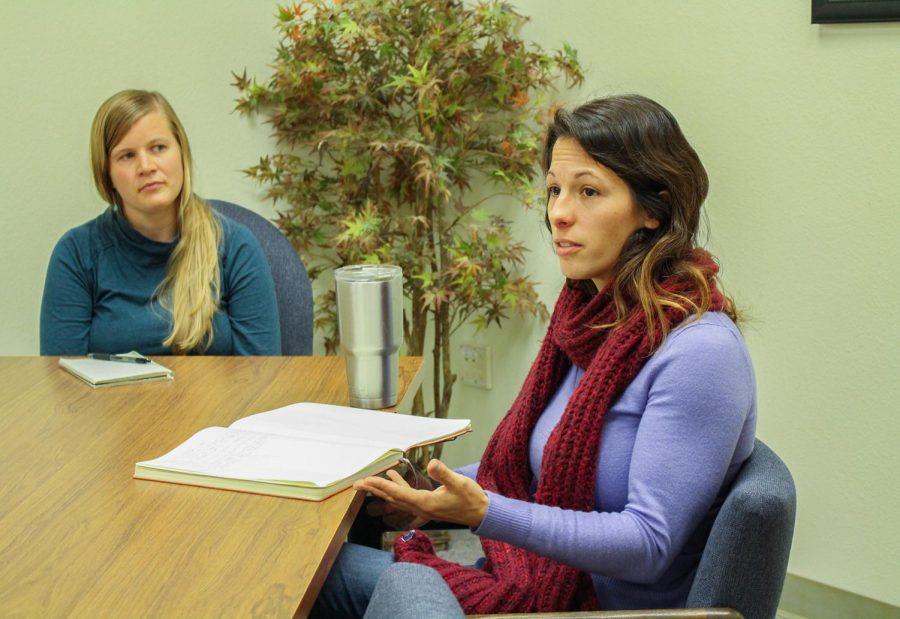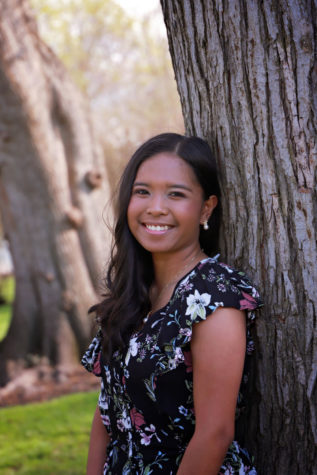Palouse celebrates Orca Recovery Day
Locals to participate in planting project to address erosion
Alison Crowley, PCD’s AmeriCorps education/outreach and restoration technician and AmeriCorps intern, explains how people can register to volunteer on palousecd.org on Friday morning at the Palouse Conservation District.
October 18, 2019
The Palouse Conservation District is hosting a volunteer planting project from 9 a.m. to noon at the Bill Chipman Trail on Saturday for Orca Recovery Day.
Jodi Prout, PCD education and outreach coordinator, said Orca Recovery Day is a statewide campaign to spread awareness about issues that affect the endangered orca whale. Conservation districts across the state will participate in different restoration projects, including trash clean-ups.
Gov. Jay Inslee established the Southern Resident Orca Task Force last year, Prout said. This was in response to the experience of Tahlequah, a Southern Resident orca whale, who carried her dead calf for 20 days and swam 1,000 miles.
She said Tahlequah’s story caught national attention and highlighted the declining population of orca whales. In the Southern Resident population alone, there are less than 75 orca whales left.
One of the main factors that has caused the orca population to decline is the decreasing population of chinook salmon, which is a food source for the orcas, Prout said. Polluted waterways negatively affect the habitats where Chinook salmon can lay eggs and rear their young.
Prout said salmon are not able to reach Pullman’s waterways due to Palouse Falls. However, our actions still affect water quality and habitats.
“The impacts we have on our water up here — a lot of the agricultural run-off, urban developments, stormwater issues — that all ends up in our waterways,” she said. “A lot of what we’re doing up here will end up in those salmon-rearing areas.”
Volunteers will plant native plants, such as chokecherry and cottonwood along Paradise Creek, Prout said. Native plants will help improve the water and soil quality, as well as provide habitat for animals.
“Doing native plantings help with filtering out any nutrients from the agricultural run-off, [and] addressing any erosion issues with the sediment that end up in our waterways,” she said.
Alison Crowley, PCD’s AmeriCorps education/outreach and restoration technician and AmeriCorps intern, said invasive species do not serve the ecosystem as well as native species do.
“Native species will be able to provide a better ecosystem service, so they’ll have a better root structure, which will help reduce erosion, which increases water quality,” she said.
Crowley said waterways are connected to one another. People’s actions will affect the waterways and eventually the species that live in the rivers, streams and oceans. She said our rivers and streams act like veins and will intersect with one another at some point.
“Everyone that lives inside these lands has a part and connection to these waterways,” Crowley said. “All of these waterways will drain into something.”
Being aware of our actions is crucial. Simple efforts such as reducing waste, recycling, and limiting the use of plastic can help improve the quality of our waterways, Crowley said.
“The fact that we’re failing these animals is showing that we’re failing ourselves at the same time,” Prout said. “As strongly tied as it is to our identity, it needs to be something that we work towards because the actions we are doing are directly affecting the outcome of both of these species.”
People can register to volunteer at PCD’s website. Because parking is limited at the site, volunteers will carpool from PCD’s office to the Bill Chipman Trail.










